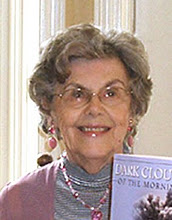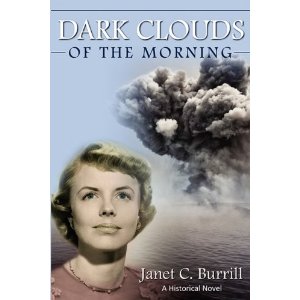 Janet C. Burrill is a Canadian author celebrating the 2011 release of her first novel, Dark Clouds of the Morning. Because we share the same first name, I’ll be using initials instead of first names in the conversation below. To make it easier, remember the guest author’s comments are always in bold.
Janet C. Burrill is a Canadian author celebrating the 2011 release of her first novel, Dark Clouds of the Morning. Because we share the same first name, I’ll be using initials instead of first names in the conversation below. To make it easier, remember the guest author’s comments are always in bold.
JS: Welcome, Janet Burrill, and thanks for joining us. You’ve published shorter work before, but congratulations on your new novel! Tell us a bit about Dark Clouds of the Morning.
JCB: The story centres around the Halifax Explosion, Canada’s worst disaster, and the world’s worst prior to the atom bomb. I created a cast of lovable characters who experienced various true-to-life situations that survivors went through at that time.
JS: Where did the story idea come from?
JCB: I became interested in the Halifax Explosion from hearing my mother tell what she knew about it. Years later, I became more interested, and decided I’d like to write a Christian novel set in this time period.
JS: Dark Clouds of the Morning is set in 1917, and the setting of Halifax, Nova Scotia, has changed a lot since then. You did a lot of research into the time period as well as into the explosion itself. Care to share some of the stranger bits of trivia you picked up?
JCB: There is a lot of material out there, where one may learn more about the subject. I collected every book I could find on it, as well as accessing information from the N. S. Archives. I discovered, for example, that the train from Boston, bearing doctors and nurses to aid in the disaster relief, ran into complications. A fierce snowstorm blew in from the Atlantic seaboard, and stalled the train on Folly Mountain, 75 miles from Halifax. Despite the efforts of the engineer and train crew, the train was immobile for several hours. All on board were frantic; Halifax needed them.
I discovered, too, that soldiers wives whose husbands were overseas were classed as prostitutes. As such, they were not given much, if any, financial help for their needs.
Another shocking thing I discovered was that those Canadians who bore German surnames were treated unfairly and blamed for the explosion. Many of the men were incarcerated, and their children had the distress of being cruelly mocked by their peers.
JS: I hadn’t known these things before reading your novel! Another thing I was surprised to learn was that the burial efforts for the Titanic victims in 1912 actually helped the citizens of Halifax when the explosion occurred five years later.
JCB: Thankfully, those who had worked to set up and operate a morgue for the Titanic victims were still around. They quickly came forth to offer their services to do the same for the explosion victims.
JS: Do you have a favourite character in the novel?
JCB: You bet! It’s the heroine, Jennie. (I’m mighty fond of several others, too.)
JS: Is there a sequel in the works?
JCB: Yes, I’m pleased to say that I’m working on it now. It follows the same characters, and introduces a few new ones.
JS: Dark Clouds of the Morning was a few years in the making, and as a member of your critique group I enjoyed hearing the early excerpts. I’m sure the sequel will come together faster because you’ve already done the research, but how long did book one take to write?
JCB: Oh, my! I’m sorry to say it took ten years, and that is because certain events in my life kept me away from writing for a while. I pray, Lord willing, this new book will come together much more quickly.
JS: Writers are told to read widely and voraciously. I think that’s one of the perks of the deal. What are you reading these days?
JCB: I always have a book on the go. There are several authors I enjoy, like Jan Karon, of the Mitford series, and Michael Phillips and Judith Pella, who co-authored the Stonewycke Trilogy, of which I’m now reading the second book. These last are historical romances, which are my favourite. (Maybe that’s why I prefer to write them.)
JS: What do your family think of your writing?
JCB: I am blessed! They all love what I write, brag about me (blush!) and help sell my books.
JS: Is there a particular song or Scripture verse that’s made a big difference for you?
JCB: God is my fortress and my strength. In Him do I trust.
JS: What’s the most surprising thing you’ve ever done?
JCB: I would say when I contacted 100 Huntley Street this summer, and told about my book. The kind lady I spoke to said, “We take people, not for what they’ve done, but for what God has done in them. Send us your testimony.” I did, and to God be the glory, they accepted me. You can view the programme here: Janet Burrill interview part 1 and Janet Burrill interview part 2.
JS: Thanks so much for taking time to let us get to know you a bit, Janet Burrill. May the LORD continue to bless you and make you a blessing to others—in every area of your life.
===
On December 6, 1917, two ships collided near the waterfront of the Halifax, Nova Scotia Harbour. One was carrying tons of munitions. On impact, a giant explosion occurred, killing and injuring thousands. Can Jennie and her family rise up from the tragedy and trauma to ultimate triumph?
See my review of Dark Clouds of the Morning.
To learn more about Janet C. Burrill or to order signed copies of Dark Clouds of the Morning visit her website. The novel is also available through online bookstores or for order in your local brick-and-mortar bookstore. The ebook is available through Books on Board.


I am in the process of reading “Dark Clouds of the Morning” right now. Since I grew up (and now live) between Halifax and Truro this book is especially interesting to me. I am enjoying the story line, the characters, the details of the explosion and especially the gospel message and faith in God brought out in the story. However I will probably never read another of Janet Burrills books. I am extremely disappointed in how she throughout the book uses the name of our precious Lord in vein. It is very disturbing every time I see His name used as a curse word in an exclamatory sense. It is hard to understand how someone who seems to have the strong faith that she portrays in her book could also have such ungodly speech. If these expletives were not used I would be interested in reading more of her works
Bonnie, this is a valid concern. It’s been a long time since I read the book, but as I recall the occasional use of the Lord’s name in this way was from characters who weren’t Christians. Sometimes in crisis situations I’ll hear a person (believer or nonbeliever) cry out God’s name and only they know if they’re cursing or praying–or if it’s a mix of both. I don’t know why the author portrayed some non-Christians using our Lord’s name in a curse, but I know she herself is a gentle woman of faith who doesn’t speak that way herself. I hope you enjoy the setting and the history, and that overall the positives will outweigh the negatives.